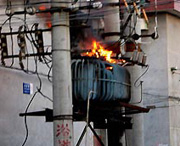|
 |
|
A transformer was caught on fire due to overloading,
Baofeng, Henan Province, June 24, 2005.
(newsphoto) |
As the Yangtze River Delta is experiencing a rapid increase in the
demand for electricity, leading to widespread power shortages, a 26 C
energy-saving campaign has been instituted to help alleviate the growing
problem.
On Saturday, nongovernmental environmental organizations made calls to
hotels, shopping malls and office buildings, asking them not to set their
air conditioners to below 26 C.
"This initiative strives to alleviate the strain on energy in China,"
said Li Jie, deputy secretary-general of the China Association for NGO
Co-operation, during a meeting in Shanghai.
The campaign, supported by the US Environmental
Defense and the Honeywell Company, will be focusing on the Yangtze River
Delta, with volunteers sent to hotels, shopping complexes
and office buildings to test
temperatures.
"The campaign aims to improve the public awareness of environmental
protection and to help governments set relevant policies for creating a
resource-efficient society," said Li.
Shanghai is expected to consume about 19 million
kilowatts per hour at peak
load
this year. This is an increase of 12 per cent on the same period
last year.
Jiangsu Province will consume about 36 million kilowatts per hour at
peak load, 5.3 million kilowatts an hour more than that of 2004, while
Zhejiang produces only 12 million kilowatts per hour of electricity, far
less than the peak demand of about 20 million kilowatts per hour.
"Air conditioners consumed 30 per cent of all electricity used in East
China during the summer of 2004, leading to an increased strain on
supplies," said Song Hongkun, deputy director of the State Grid
Corporation's Power Demand Management Instruction Centre.
A rough calculation shows Shanghai can save energy valued at 1 billion
yuan (US$123 million) by launching the campaign, if hotels, shopping
malls, public buildings and households set their air-conditioners to 26 C,
said Che Fei, director of Communications and Community Affairs at
Honeywell China.
"China needs such a stimulus to alleviate the power pressure, because
energy demand is expected to double by 2020," said Daniel Dudek, chief
economist of Environmental Defense.
"Energy supply problems are managed by a whole portfolio of strategies,
not just by building new power plants."
Dudek said the way in which this increase in the demand for electricity
is met is a significant factor in determining future environmental burdens
and expenditures.
If power demand growth is reduced by 10 per cent, this would reduce
carbon dioxide emissions by 30 per cent.
(BBC) | 